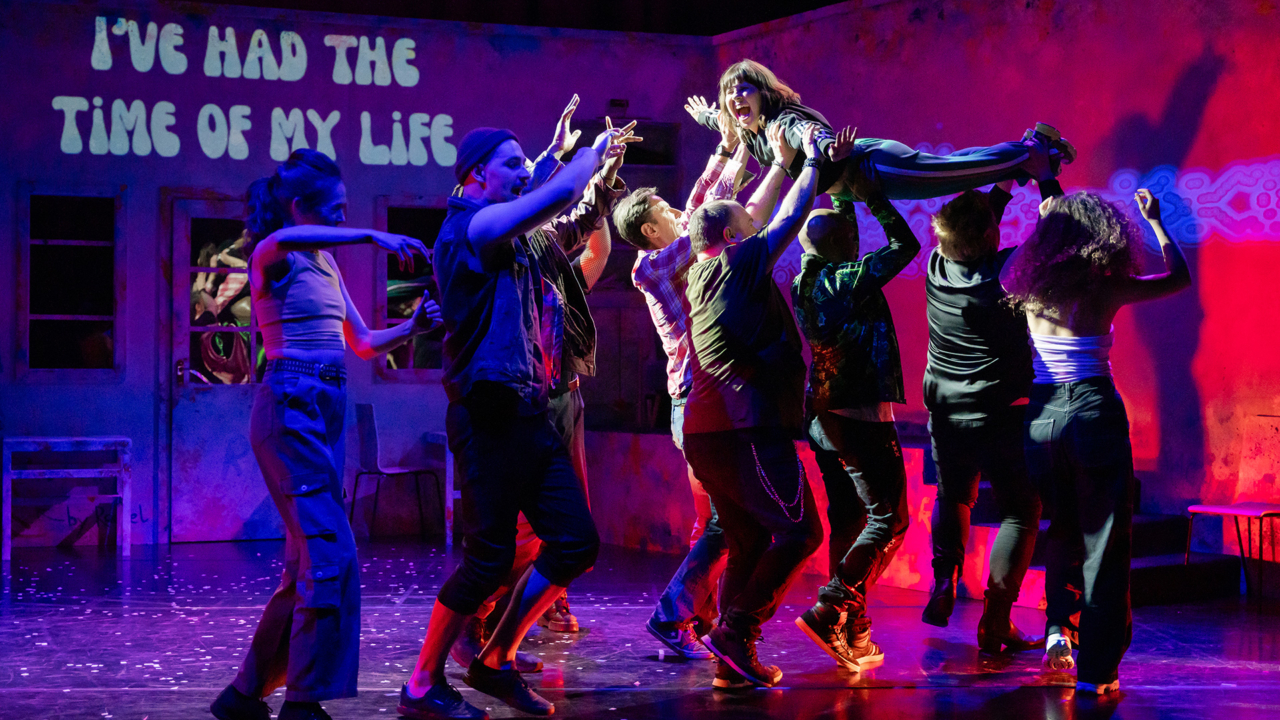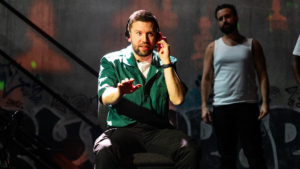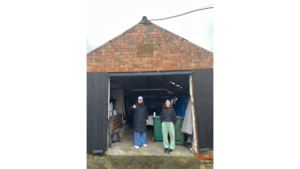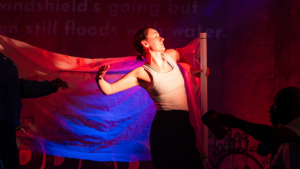- Posted on November 11th, 2024
Zoo Co Creative – Championing Accessibility and Sustainability in Theatre

For Arts Council England and Julie’s Bicycle’s annual report 2023-24, we feature over 50 practical examples of cultural organisations taking climate action including 9 other in depth case studies like this one. Check out the full interactive report here.
This case study was written by Zoo Co Creative, a theatre company based in Croydon with the aim to make innovative, bold, and electric live theatre. They share how becoming access leads enabled them to explore the intersection between disability rights and the climate emergency.
The Access Library
Zoo Co Creative were invited to be Access Leads for Croydon’s year as London Borough of Culture in 2023-24. Levels of knowledge and confidence in access provision were varied in the borough; it was our role to upskill cultural organisations in making their events as accessible as possible.
As an inclusive theatre company, we’re really interested in the intersection between disability rights and the climate emergency. The two issues don’t always sit easily side by side, and sometimes feel at odds with one another (e.g., using plastic drinking straws, or modes of transport required by disabled people).
But we also know that the climate emergency affects disabled people more acutely than non-disabled people (e.g., heatwaves and other extreme weather, air pollution), which is why this topic is important to us as an organisation.
Fleur, our Creative Access Director, had the idea of creating and maintaining a library of access equipment that could be loaned out free of charge to make events more accessible. Supported by funding from Place Partnerships, we set up the Access Library to include:
- An Audio Description Kit
- Projectors for creative captioning
- Ear defenders
- A set of radios to keep support workers in touch at large events
- Breakout space materials (beanbags, fidget toys, colouring books, and pens)
- Rest area materials (screens, Zed Beds, inflatable beds, bedding, blankets, weighted blankets)

The Access Library was an immediate hit: people made good use of what was there—across 2023-24, sets of items were loaned out 35 times, resulting in hundreds of audience members / visitors taking advantage of the items on offer, at no cost to the event organisers (though transport is a factor).
The networks created during Borough of Culture formed our key partnerships for this project. Some of the organisations involved kindly offered to share kit to be listed on the Access Library inventory. We built strong bonds with Croydon cultural organisations and spread the word via a new website.
We provided free consultancy to the Croydon cultural organisations, and the Access Library provided a straightforward ‘next step’ for these groups—a chance to put the ideas generated during consultancy into practice.
“We are proud to have supported the Access Manifesto and library in Croydon, an inspirational new resource and toolkit to equip creative organisations to deliver more inclusive and accessible events. Its continued development and roll-out will help shape a strong and enduring legacy for This Is Croydon, London Borough of Culture 2023, for the benefit of everyone in the borough.”
– Angie Farrance, Senior Policy Officer, London Borough of Culture, Greater London Authority

Seeing some alignment between disability rights and the climate emergency has been unifying and motivating for our staff, sparking discussion and generating new ideas.
We see the Access Library as a crossover moment for sustainability and access; 20 organisations could host an audio-described performance, without purchasing 20 sets of high-end electronics. Moments of alignment like this are really satisfying for us and further both causes.
Community and Collaboration
Our landlords Stanley Arts supported the project by donating the storage space for the Access Library. We soon noticed that on-site storage gave us the opportunity to process other items of ours more sustainably.
We have off-site storage in a barn in Surrey (a 45-minute drive away). Inspired by the appetite for sharing access equipment, we decided to get other things languishing in storage back into circulation. We made an inventory as a starting point: what was really going to get used again vs what were we keeping ‘just in case’, or because we hadn’t really had the headspace to process it?

We started listing large items on Set Reuse sites, and bringing smaller items back to sort and store temporarily on-site before passing them on to our neighbours, via Olio, eBay, and Facebook groups.
We’ve really enjoyed collecting the quirky stories around some of the giveaways, and connecting with our community:
- Company 3 took 6 bags of long lengths of fabric. 2 other long lengths of fabric went to a local Viking reenactment fan who planned to make a ‘really offensive pair of trousers’.
- Long lengths of rope (> 10m) (from our outdoor show Delight in the Woods) were passed to a Redhill primary school for practising measurements outdoors.
- Gardening tools (from Delight) were passed to a local Croydon school for Forest School sessions.
- 2 garden incinerator bins (from Delight) went to local Croydon gardens / allotment holders. 2 watering cans also given away.
We’ve also generated a small amount of income—about £300 over the last year in sales (e.g., a stack of plywood we weren’t using).
Processing stored items can be more difficult—it can be emotional to let go of items from a well-loved show that you hoped might tour again.
And there are overwhelming moments—gazing at a living room full of 20m lengths of fabric that need a wash before they can be passed on.
Our advice is to talk it through as a group, go as far as you can without causing pain, and remind people that these things could be put to good use by someone else now, instead of sitting in a shed getting mustier and dustier.
A small amount of on-site storage allows for a little-and-often approach: list one thing a week, wash one set of costumes a week.

Sustainability Tracking
We began tracking carbon on Perfect Show for Rachel (our Barbican show, staged in 2022) to start understanding the carbon impact of our productions. We continued that exercise with Night Shift the following year to build a more complete picture of our footprint, and to see where we might be able to improve in future.
We collected data on anything that had a carbon impact, from team travel to energy use, to shipping and materials in costume and sets, and developed tracking tools in Excel to store and crunch the data. We had a dedicated team member gathering the information and analysed it with existing carbon calculators. Having one team member responsible for data gathering was really important for keeping on track and for having a complete picture. It’s a time-consuming exercise, especially during a busy production phase, but one that we were really keen to make happen.
Thanks to the sustainability tracking, we were able to work out that 94% of our costumes and props on the production came from recycled and reused sources, vs 25% of materials used in the set build. Having this information means that we know where to focus our future sustainability efforts—whether that’s by having conversations with our set builders around using more sustainable materials, or by factoring in more lead-in time around design to ensure that we can source materials ourselves.

Header image: The cast of Perfect Show For Rachel – Zoo Co Creative and Improbable – Credits: Ikin Yum
